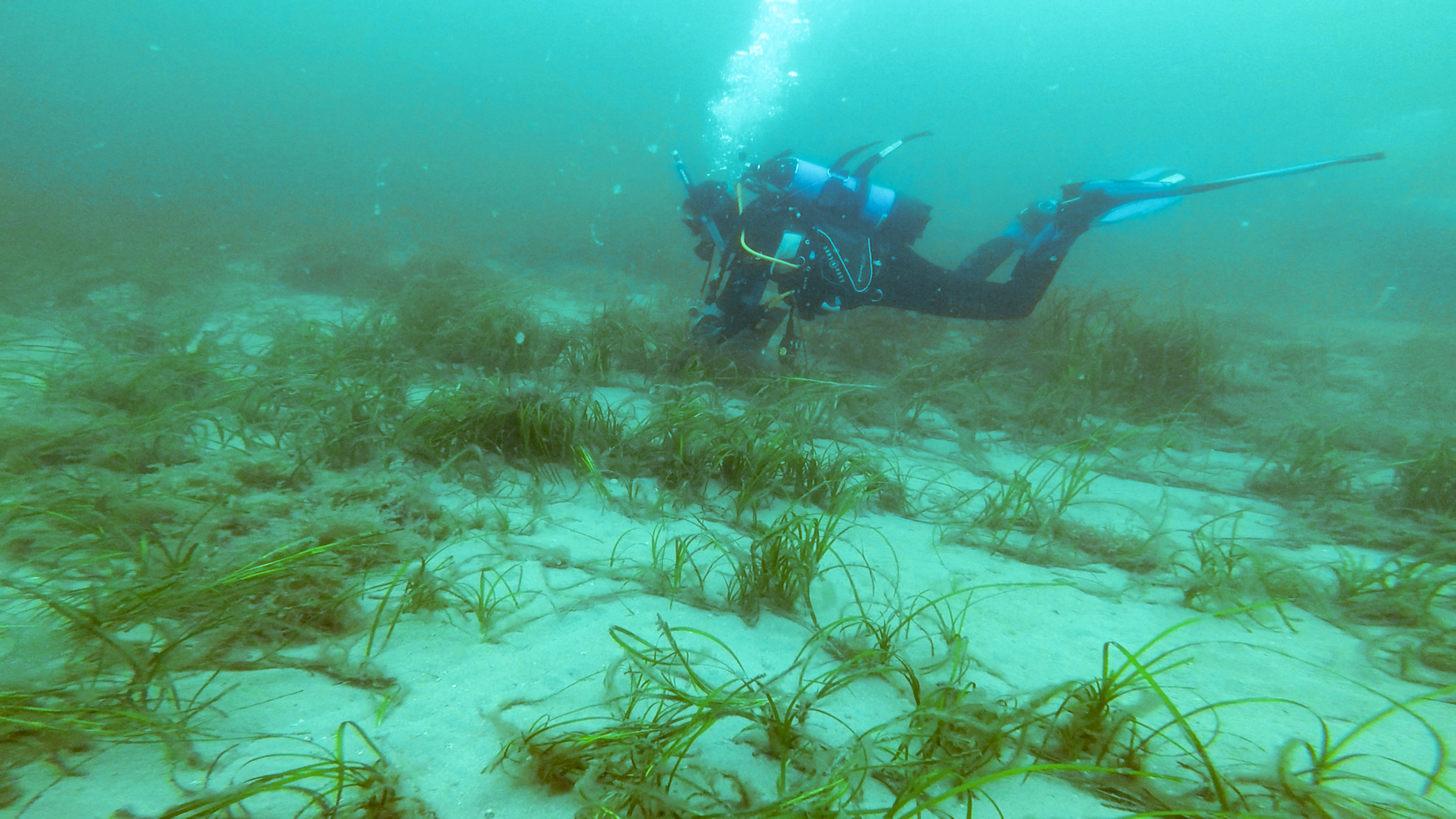BIAZA’s Andy Hall writes about Sir David Attenborough’s seminal Wild Isles, and how this is a moment to inspire a new movement for nature.
There are several gut punches in Sir David Attenborough’s Wild Isles. The UK is one of the most nature depleted countries in the world. Wild salmon populations are in free fall. The UK’s globally important population of puffins is expected to decline 90% by 2050. But there were also many awe-inspiring moments from the master narrator and his team. From basking sharks to golden eagles, there was proof time and again that we have amazing wildlife on our doorstep in the UK if only we’d make the space for them and take the time to look.
Successive governments have failed to leave the UK’s nature in a better state then they inherited it. That means each government has overseen a loss in nature. But conservation can work. The series showed time and again, from the introductions of beavers to no-catch-zones, that we can make a difference.

Seagrass habitat being restored by the Ocean Conservation Trust/National Marine Aquarium
For me, the answer is clear. We must take this opportunity to inspire a nationwide movement for nature. Much as Blue Planet II inspired a crackdown on plastics, we need Wild Isles to inspire a generation to love British nature and hold Governments to account.
Zoos and aquariums were somewhat unseen players in this beautiful series. A 2021 research paper showed the fate of 29 native species rests in the hands of zoos and aquariums and at least 76 native species are being restored by the work of zoos. BIAZA zoos and aquariums have been integral to the conservation of many species featured in the series and many more that weren’t featured:
- Five sisters Zoo has provided veterinary services for 150 beavers which allows these beavers to be relocated from conflict areas where otherwise lethal control licenses may have been issued.
- Wild Planet Trust, the National Marine Aquarium, the Deep and others have been restoring seagrass around the coast, providing vital habitats for a whole marine ecosystem.
- Welsh Mountain Zoo, Mablethorpe Seal Sanctuary, and Exploris Aquarium have provided important rehabilitation and release for seals in peril.
- Chester Zoo and Royal Zoological Society of Scotland have been working for our native insects, including Critically Endangered moths and pine hoverflies.
- Many zoos and safari parks are restoring woodland habitats. Folly Farm is part of a Welsh Government scheme which aims to provide a tree, free of charge, to every household across Wales.
- Zoos and aquariums such as ZSL London Zoo, Chessington World of Adventures and The Deep have been integral to the reintroduction of hundreds of Fen Raft Spiders to the wild.
- Fifty BIAZA members including Twycross Zoo and Birdworld have been involved in BIAZA’s Spotted on Site campaign, which has so far documented 30,716 observations of 2,910 native species across the UK and Ireland. This provides critical data in the fight for nature.
But zoos and aquariums need to do much more. As experts in conservation and public engagement, zoos and aquariums need to be at the very forefront of a movement for nature. Our members need to inspire the public to act, have more conversations with our politicians and policy makers and maximising conservation efforts.
This may be Sir David’s last series (though we all hope it won’t be), and I think there’s no finer legacy than leaving behind a nation that loves and protects nature.
By Andy Hall,
Public Affairs and Communications Manager, BIAZA
28 April – 1 May, BIAZA’s Spotted on Site campaign is running a special ‘SoS Bioblitz’ weekend to boost records of native species, click here to get involved.
BIAZA’s Great British Wildlife Restoration is raising awareness of native species conservation among politicians. To submit a project click here.
-
News
.png?w=100&h=100&zc=1&f=jpeg&hash=97e6d151315c515d23f80e6ee9d1d533) Love is in the air as pygmy marmoset Tumble arrives at Shaldon Wildlife Trust 13th February, 2026Shaldon Wildlife Trust is celebrating a very small but very special love story this Valentine’s season with the arrival of a new female pygmy marmoset…
Love is in the air as pygmy marmoset Tumble arrives at Shaldon Wildlife Trust 13th February, 2026Shaldon Wildlife Trust is celebrating a very small but very special love story this Valentine’s season with the arrival of a new female pygmy marmoset… -
News
.png?w=100&h=100&zc=1&f=jpeg&hash=65ba18ab3dddd57e0f31f999ec4849db) Double baby joy at Paignton Zoo as second rare white monkey born 11th February, 2026Paignton Zoo is celebrating a rare double baby boom after welcoming a second endangered king colobus monkey this winter, marking the zoo’s first…
Double baby joy at Paignton Zoo as second rare white monkey born 11th February, 2026Paignton Zoo is celebrating a rare double baby boom after welcoming a second endangered king colobus monkey this winter, marking the zoo’s first… -
News
.png?w=100&h=100&zc=1&f=jpeg&hash=92e90cf6a944ad40ff665483a5744aa4) Blog: Zoos have a duty to source their plants sustainably 10th February, 2026Do you know where your purchased plants come from? In our latest blog, the BIAZA Plant Working Group details how zoos/aquariums can work together…
Blog: Zoos have a duty to source their plants sustainably 10th February, 2026Do you know where your purchased plants come from? In our latest blog, the BIAZA Plant Working Group details how zoos/aquariums can work together…



